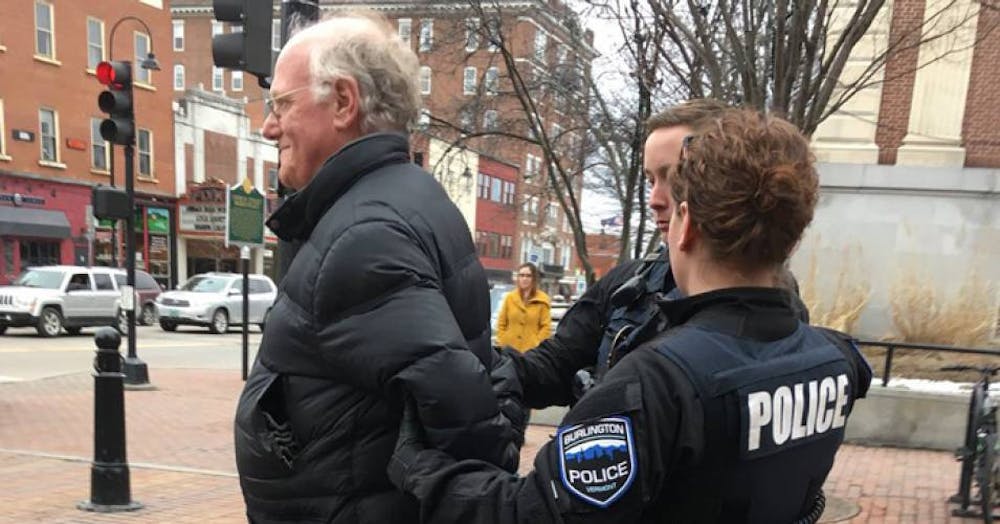BURLINGTON — Ben Cohen, co-founder of Ben and Jerry’s ice-cream, was arrested in Burlington last Tuesday for violating the city’s noise ordinances. He and two other activists were protesting the proposal to bring F-35 fighter jets to Burlington International Airport. From speakers attached to the back of a pickup truck, they played sounds simulating the noise-level of a jet flying above.
Their objective? To demonstrate the disruption that the planes will cause in the community.
For more than five years, residents around the airport have been bracing for the arrival of 18 new F-35s. The jet is touted as one of the most technologically advanced systems ever designed, commissioned to replace the aging F-16s. But such ambitions have led to significant cost overruns, delays, safety concerns and a myriad of other issues. In Vermont, critics have zoned in on another key concern: noise. Four times louder than the old jets, the F-35s will displace a large population of South Burlington residents living near the airport.
According to federal regulations, the Federal Aviation Administration (FAA) has the authority to initiate voluntary buyout programs in areas where the noise average exceeds 65 decibels. At this level, people are at risk of hearing loss, and children are at risk of suffering from developmental issues. The FAA has already bought and demolished over 200 homes in the vicinity of Burlington Airport. It plans to do more.
“I felt like it [our house] was being taken away from us by people that couldn’t give a shit, really. They didn’t care,” said Carmine Sargent, a local resident of 45 years, in an interview with the VTDigger.
Critics argue that politicians and businesses are using the FAA to advance their own agendas. They claim that the Burlington government, instead of supporting non-destructive efforts to mitigate noise, are demolishing low-income neighborhoods to expand the airport.
“They want a hotel on their own property. They want restaurants. There was an idea for a spa over there,” a local resident said of Burlington’s officials. “It does not meet the reality and the needs of this area. And at the same time, you’ve destroyed a great neighborhood.”
Officials resist the accusations. In a community meeting last February, Richard Doucette, the FAA’s New England Environmental Program manager, talked to residents about the viability of different noise protection efforts that don’t involve buyouts.
“Theoretically, there are measures, and if [noise barriers] were found to be more effective, we would have built more. But we haven’t built any since I’ve been with the FAA in New England,” Doucette said, stressing the limited options they have at protecting residents from noise.
Many critics have also suggested alternatives to the F-35. In a letter to voters, lawmakers from Chittenden County cited Air Force statements from 2010 assuring residents that the Vermont Air National Guard will maintain a presence regardless of the status of the F-35.
“[The National Guard] could fly another fighter aircraft, or a military transport, or drones, or perform cyber security missions,” the lawmakers wrote in their letter.
But it’s unlikely that officials will reconsider the arrival of the 18 jets. The Vermont Guard is built around its fighter squadron, making the jets a crucial part of their missions overseas. Currently, they are preparing for a major deployment in 2019. As part of the efforts, 41 airmen are training in facilities around the country to fly and maintain the F-35s.
“There is no alternative mission being planned for the Vermont Air National Guard,” said Maj. Gen. Steven Cray in a press conference last Friday.
The state’s congressional delegation is also unanimous in its support for the F-35. In fact, Senator Patrick Leahy has faced controversy over his role in bringing the jets to Vermont, pressuring the Air Force to abandon their preferred locations. In a statement to the VTDigger, he denied these allegations.
Much of the support for the F-35 jets stems from the economic benefits that the airport and its military use brings to the city. In an interview with VPR, Lt. Col. Daniel Finnegan of the F-35 integration office, said that the Guard has already spent $83 million preparing the base, and will be doing more. In addition to the one-time integration efforts, the airport receives millions in annual funding from the FAA thanks to its nature as a dual-purpose civilian and military airport. Many supplementary jobs, like the Guard’s Aircraft Rescue and Firefighting force (which spends about $2 million dollars annually), exist thanks to the jets.
Their support is shared by many in the business community. The Greater Burlington Industrial Corporation (GBIC), a non-profit promoting economic interests in the region, has advocated in favor of the jets.
“The airport is our number one, two and three economic stimulators,” said Ernie Pomerleau of the GBIC in an interview with the VTDigger. “Anything I can do to strengthen the economic viability of Burlington, Vermont, I’m in.”
In addition to the direct jobs that the Guard’s forces provide, improvements to Burlington Airport are part of a larger plan by lawmakers and business leaders to revitalize the aerospace industry in the state. There are companies across New England and Quebec that they hope to attract to Vermont. GE Aviation, which landed a $1 billion contract to manufacture F-35 engines in 2016, for example, runs a plant in Rutland.
Still, to the residents losing their houses, such arguments appear dismissive, and the officials’ response even patronizing.
“For me, this is my home,” a local resident said. “A lot of people don’t get this. Well, if you grow up in a home, and you’ve been there for 30, 40, 80 years, you get attached to your home. You have memories there.”




